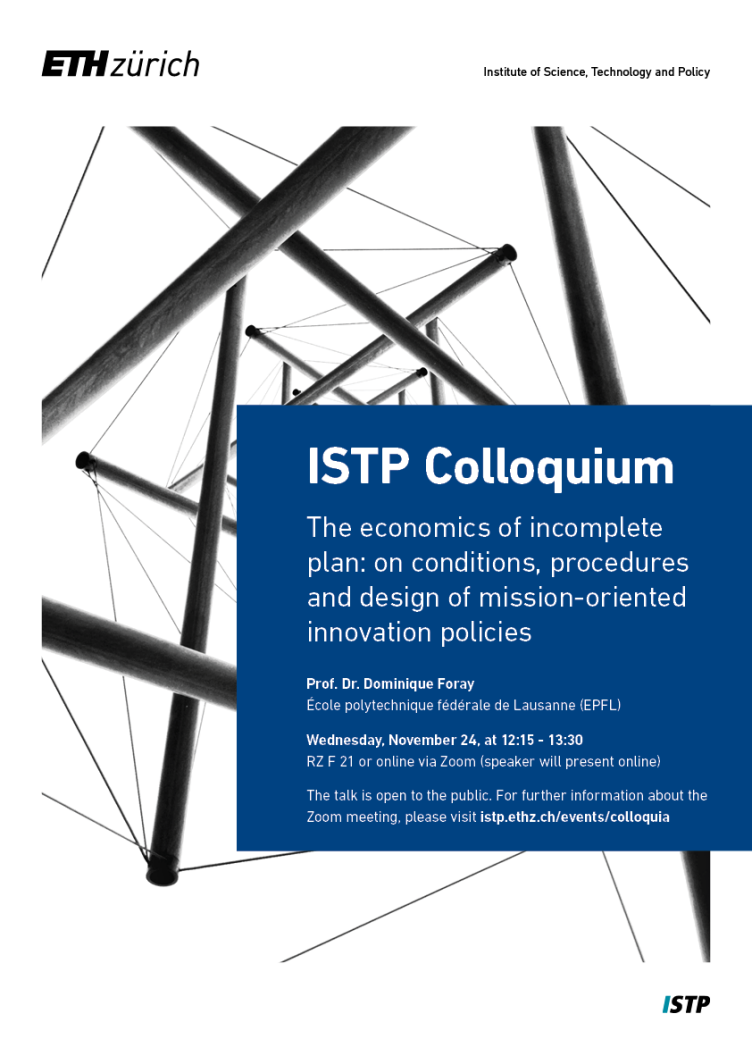Colloquium: Prof. Dominique Foray
Wednesday, Nov 24, 2021, at 12.15 - 13.30
Room RZ F 21 or Online, Zoom | Sign up here
The economics of incomplete plan: on conditions, procedures and design of mission-oriented innovation policies

The buzzword in industrial policy and innovation policy circles is mission-oriented innovation policy (MOIP) – which means a policy to encourage innovation intended to accomplish a certain mission – whether it be a societal challenge (climate change, global health) or an industrial policy issue (sectoral transition or modernisation, establishment of a new industry). This new category results from what seems a priori to be just a simple qualifying extension of mission-oriented policies (MOPs) – very much in vogue in the 70’s and 80’s and used particularly in sectors like space and defence.
However, this ‘simple’ qualifying extension does in fact cause a significant discontinuity that merits reflection. A category that was relatively coherent - MOPs as allocation and coordination mechanisms of public resources enabling the attainment of a purely technological objective, decided by a State and executed by a small number of public agencies and firms – has been made into an oxymoron by adding the word “innovation”! More precisely, the oxymoron is the result of the clash between the terms mission and innovation.
While a mission imposes a discipline and centralised priorities and decisions, innovation on the other hand can’t be planned. Innovation is so uncertain that no plan will ever enable it to be tamed. There is thus a tension between faire (doing or deciding on a direction) and laissez-faire (innovating), between a planning logic and a freedom to experiment logic.
This tension implies thus advancing our knowledge about MOIP design. In any case of MOIP, the policy design cannot elude the confrontation between the mission logic and the innovation logic. For this confrontation between the two logics to be productive and successful, it must be considered as being inevitable and the appropriate policy design to transcend it must be determined. To do this, I will propose the concept of incomplete plan. Our MOIP approach is thus marked by a high level of intentionality and strategic focus. But, it is also characterised by a high level of discovery and initiative by the actors of the innovation process. It is this combination of two policy logics – a planning logic and a discovery logic – that constitutes its trademark. Some concrete applications will be presented.
About Prof. Dr. Dominique Foray
Dominique Foray is a full professor at the EPF Lausanne, where he heads the Chair of Economics and Management of Innovation. His research focuses on the microeconomics of innovation, of knowledge and of related institutions. He joined the National Center for Scientific Research CNRS (Lyon), was a professor at the Ecole Centrale de Paris, research director at CNRS and principal analyst at the OECD.
Between 2007 and 2010, he chaired the European Commission’s Knowledge for Growth expert group, and since then has widely contributed to the development of the EU smart specialisation policy concept, of which he is the author. Between 2012 and 2015, he was the foreign member of the German Expert Commission on Research and Innovation (EFI), which advises the German Federal Chancellery directly, and has served on the Expert Group for the first Swiss National Report on Research and Innovation.
Dominique Foray has been a member of the Swiss Science Council since 2016. Also, he currently chairs the KOF Advisory Board.